EMPIRE OF CHAOS
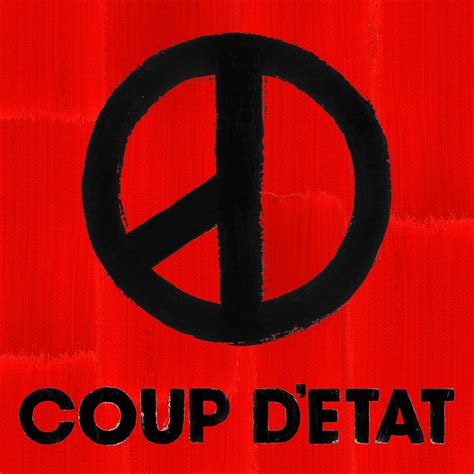
OVERTHROWN

Instances of the United
States overthrowing, attempting to overthrow,
or participating in the overthrow, of a foreign government,
since the Second World War.
source: author William
Blum
China 1949 to early 1960s
Albania 1949-53
East Germany 1950s
Iran 1953 *
Guatemala 1954 *
Costa Rica mid-1950s
Syria 1956-7
Egypt 1957
Indonesia 1957-8
British Guiana 1953-64 *
Iraq 1963 *
North Vietnam 1945-73
Cambodia 1955-70 *
Laos 1958 *, 1959 *, 1960 *
Ecuador 1960-63 *
Congo 1960 *
France 1965
Brazil 1962-64 *
Dominican Republic 1963 *
Cuba 1959 to present
Bolivia 1964 *
Indonesia 1965 *
Ghana 1966 *
Chile 1964-73 *
Greece 1967 *
Costa Rica 1970-71
Bolivia 1971 *
Australia 1973-75 *
Angola 1975, 1980s
Zaire 1975
Portugal 1974-76 *
Jamaica 1976-80 *
Seychelles 1979-81
Chad 1981-82 *
Grenada 1983 *
South Yemen 1982-84
Suriname 1982-84
Fiji 1987 *
Libya 1980s
Nicaragua 1981-90 *
Panama 1989 *
Bulgaria 1990 *
Albania 1991 *
Iraq 1991
Afghanistan 1980s *
Somalia 1993
Yugoslavia 1999-2000 *
Ecuador 2000 *
Afghanistan 2001 *
Venezuela 2002 *
Iraq 2003 *
Haiti 2004 *
Somalia 2007 to present
Libya 2011*
Syria 2012
(* indicates successful ouster
of a government)
"Coups happen because very
wealthy people want them and help to make them happen - people
who are used to seeing the country as a money machine and suddenly
see social legislation on behalf of the poor as a threat to their
interests."
Robert White, former U.S. ambassador
to El Salvador and former president of the Center for International
Policy

OVERTHROWN
(A PARTIAL LIST)
The United States has
overthrown, supported the overthrow, or assassinated democratically-elected
leaders, or political leaders who were supported by the majority
of their populations. The result was that authoritarian repressive
governments, that lacked popular support, came to power, and the
countries and their people suffered as a result
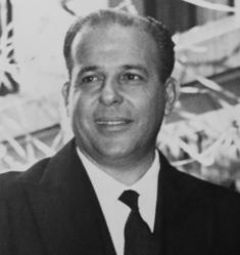
BRAZIL
Joao Goulart - 1964
Joao Goulart was the left-leaning
president of Brazil from 1961-1964.
Goulart pursued education reform which aimed to combat adult illiteracy,
reform of the universities and a prohibition on the operation
of private schools. He proposed that a 15% tax on income produced
in Brazil be directed toward education. The income tax was reformed,
and voting rights were extended. Non-productive properties larger
than 600 hectares were to be expropriated and redistributed to
the population by the government.
Goulart was not favorably viewed in Washington, because he took
an independent stand in foreign policy, resumed relations with
socialist countries and opposed sanctions against Cuba.
The United States encouraged senior Brazilian military officers
to seize power and to back army chief of staff General Humberto
de Alencar Castelo Branco as coup leader. General Branco led an
April 1964 coup of the constitutional government of President
Goulart and was installed as first president of the military regime,
immediately declaring a state of siege and arresting more than
50,000 political opponents within the first month of seizing power,
while the US government expressed approval and re-instituted aid
and investment in the country.
Goulart first sought political asylum in Uruguay and then went
to live in Argentina, where he died in 1976.
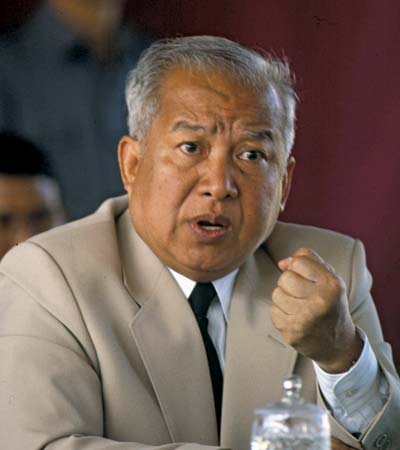
CAMBODIA
Norodom Sihanouk - 1970
Norodom Sihanouk became king of
Cambodia in 1941 and remained so amid the Japanese occupation
during the Second World War. Post-war, Sihanouk secured Cambodian
independence from France in 1953. In 1955, Sihanouk abdicated
the throne and formed the political organization Sangkum, which
won the 1955 general election. As Prime Minister, he governed
Cambodia under one-party rule. Officially neutral in foreign relations,
in practice he was closer to the communist bloc.
The bombing of Cambodia by the United States beginning in 1969,
weakened Sihanouk and led to the 1970 military coup that ousted
him from power.
The bombing from 1969 to 1972, left 600,000 civilians dead, millions
of refugees, tens-of-thousands dying from disease and starvation,
and the Cambodian economy and culture in ruins. The guerrilla
army of the Khmer Rouge led by Pol Pot finally took power in 1975.
Once in power, Pol Pot emptied the cities, forcing the people
into the countryside. Virtually all educated people were killed
and more than 1.5 million people perished in this genocide. Only
when the Khmer Rouge was ousted by Vietnam in 1979, did the terror
stop.
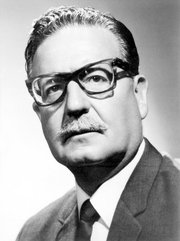
CHILE
Salvador Allende - 1973
Augusto Pinochet assumed power
in Chile following a United States-backed coup in 1973 that overthrew
the democratically-elected socialist government of President Salvador
Allende and ended 150 years of civilian rule.
Richard Nixon and Henry Kissinger made the Chilean economy "scream"
in their attempt to remove Allende, but he remained in office
with overwhelming popular support until the bloody CIA-orchestrated
coup, during which Allende took his own life.
Tens of thousands of Chileans were tortured, killed, and exiled
during Pinochet's rule. Despite Chile's human rights record, the
U.S. government continued to support Pinochet. Even the state-sponsored
assassination of Chile's former Ambassador to the U.S., Orlando
Letelier, in the United States, did not convince the U.S. to break
with Pinochet.
Pinochet's military government implemented economic liberalization,
banned trade unions and privatized social security and hundreds
of state-owned enterprises. Economic inequality dramatically increased.
His fortune grew considerably during his years in power through
dozens of bank accounts secretly held abroad and a fortune in
real estate. He was later prosecuted for embezzlement and tax
fraud.
In a 1988 plebiscite, Pinochet was defeated, leading to democratic
elections. After stepping down in 1990, Pinochet continued to
serve as Commander-in-Chief of the Chilean Army until 10 March
1998, when he retired and became a senator-for-life.
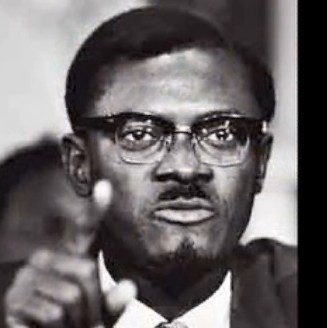
CONGO
(DEMOCRATIC REPUBLIC OF THE CONGO/ZAIRE)
Patrice Lumumba - 1960
Patrice Lumumba was a Congolese
politician and independence leader who served as the first Prime
Minister of the independent Democratic Republic of the Congo (then
Republic of the Congo) from June until September 1960. He played
a significant role in the transformation of the Congo from a colony
of Belgium into an independent republic. Ideologically he was
an African nationalist and a Pan-Africanist.
At the onset of his premiership Lumumba had two main goals: to
ensure that independence would bring a legitimate improvement
in the quality of life for the Congolese, and to unify the country
in a centralized state by eliminating tribalism and regionalism.
In eliminating all notions of tribalism and regionalism in the
Congo Lumumba was heavily inspired by of Kwame Nkrumah of Ghana.
When Lumumba embraced socialism, US companies feared they might
lose control of Congo's precious cobalt, copper, and diamonds.
A Belgian Commission report in 2001 states that there had been
earlier U.S. and Belgian plots to kill Lumumba. Among them was
a Central Intelligence Agency-sponsored attempt to poison him,
which came on orders from U.S. President Dwight D. Eisenhower.
CIA chemist Sidney Gottlieb devised a poison resembling toothpaste.
In September 1960, Gottlieb brought a vial of the poison to the
Congo with plans to place it on Lumumba's toothbrush. However,
the plot was later abandoned.
Finally, the CIA deposed Lumumba in July 1960 and replaced him
with Mobutu Sese Seko who completed the job for the United States,
assassinating Lumumba by firing squad in September 1960, three
months after he was overthrown in the CIA-directed coup.
The inauguration of John F. Kennedy in January 1961 caused fear
among Mobutu's faction and within the CIA that the incoming administration
would shift its favor to the imprisoned Lumumba. While awaiting
his presidential inauguration, Kennedy had come to believe that
Lumumba should be released from custody, though not be allowed
to return to power. Lumumba was killed three days before Kennedy's
inauguration on 20 January, though Kennedy would not learn of
the killing until 13 February.
Mobutu changed the DRCongo's name to Zaire, and as the United
States' main man in Central Africa, Mobutu amassed a multi-billion
personal fortune at his nation's expense. In the name of anti-communism,
he imprisoned and tortured, often without trial, anyone who threatened
his power base.
DRCongo's short lived attempt at popular democracy failed when
Patrice Lumumba was assassinated with the active participation
of the United States.
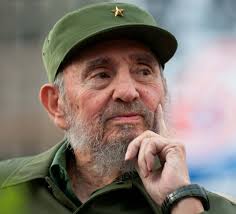
CUBA
Fidel Castro - 1959-2008
Fidel Castro adopted leftist anti-imperialist
politics while studying law at the University of Havana. After
participating in rebellions against right-wing governments in
the Dominican Republic and Colombia, he planned the overthrow
of Cuban President Fulgencio Batista. In 1954 in Mexico Castro
formed a revolutionary group, the '26th of July Movement' with
his brother Raúl Castro and Che Guevara. Returning to Cuba,
Castro took a key role in the Cuban Revolution by leading the
Movement in a guerrilla war against Batista's forces. After Batista's
overthrow in 1959, Castro assumed military and political power
as Cuba's Prime Minister.
The United States came to oppose Castro's government and unsuccessfully
attempted to remove him by assassination, economic blockade and
counter-revolution, including the Bay of Pigs Invasion of 1961.
Countering these threats, Castro formed an alliance with the Soviet
Union and allowed the Soviets to place nuclear weapons in Cuba,
sparking the Cuban Missile Crisis a defining incident
of the Cold War in 1962.
Castro converted Cuba into a one-party, socialist state under
Communist Party rule, the first in the Western Hemisphere. Policies
introducing central economic planning and expanding healthcare
and education were accompanied by state control of the press and
the suppression of internal dissent. Abroad, Castro supported
anti-imperialist revolutionary groups, backing the establishment
of Marxist governments in Chile, Nicaragua and Grenada, as well
as sending troops to aid allies in the Yom Kippur, Ogaden, and
Angolan Civil War. These actions, coupled with Castro's leadership
of the Non-Aligned Movement from 1979 to 1983 and Cuba's medical
internationalism, increased Cuba's profile on the world stage.
Following the Soviet Union's dissolution in 1991, Castro led Cuba
through the economic downturn, embracing environmentalist and
anti-globalization ideas. In the 2000s, Castro forged alliances
in the Latin American "pink tide" namely
with Hugo Chávez's Venezuela and signed Cuba
up to the Bolivarian Alliance for the Americas.
In 2006, Castro transferred his responsibilities to Vice President
Raúl Castro, who was elected to the presidency by the National
Assembly in 2008. Fidel Castro died in 2016 at the age of 90.
Castro polarized world opinion. His supporters view him as a champion
of socialism and anti-imperialism whose revolutionary regime advanced
economic and social justice while securing Cuba's independence
from American imperialism. Critics view him as a dictator whose
administration oversaw human-rights abuses, the exodus of a large
number of Cubans and the impoverishment of the country's economy.
Castro was decorated with various international awards and significantly
influenced individuals and groups across the world.

ECUADOR
Jaime Roldos - 1981
Jaime Roldos ran for president
of Ecuador in 1978 on a populist platform. During his first year
as President he reduced the workweek to 40 hours and doubled the
minimum wage.
Roldós' most important accomplishment was his policy in
support of human rights, in an era in which most Latin American
countries were military dictatorships, Roldós met with
the democratically elected presidents of the Andean region (Venezuela,
Colombia, and Peru), proposed the signing of a Charter of Conduct,
in which the principles of universal justice and human rights
were re-affirmed, signaling protection of human rights as an important
principle.
His stance on human-rights led him to clash with right-wing Latin
American leaders.
This policy was questioned by American conservatives, who considered
it an excuse to justify Soviet meddling in the region. The United
States condemned the "Roldós doctrine", as they
did that of Panamanian Omar Torrijos, who also died in a plane
crash several months later. Following the 1980 U.S. presidential
election of Ronald Reagan, bilateral relations with the USA became
strained.
Shortly after sending his legislative package on the oil sector
reform, in early 1981, Roldós warned foreign interests
that if they wouldn't contribute to the progress of the Ecuadorean
people, they would have to leave the country. Additionally, the
pact on human rights reached with Colombia and Peru was seen by
the Reagan Administration as a tilt toward the Soviet Union.
On May 24, 1981, a plane carrying the Roldos crashed in the mountains
of Ecuador, killing Roldos and his entourage.
American author John Perkins, in his book 'Confessions of an Economic
Hit Man', concludes that Roldós was assassinated, because
his plan to reorganize the hydrocarbon sector would have threatened
U.S. oil interests, which had engaged in a lobbying and public
relations campaign against Roldós' government.
Just months after Roldós died, another Latin American leader
who had been at odds with U.S. interests in the control of the
Panama Canal, Panama's Omar Torrijos, also died in a plane crash,
which some believe was a CIA-conducted assassination.
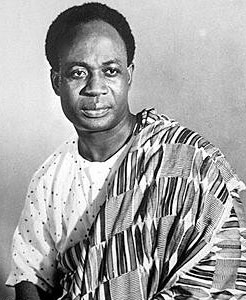
GHANA
Kwame Nkrumah - 1966
Kwame Nkrumah was the first prime
minister and president of Ghana, having led it to independence
from Britain in 1957. An influential advocate of Pan-Africanism,
Nkrumah was a founding member of the Organization of African Unity.
He became prime minister in 1952 and retained this position when
Ghana declared independence from Britain in 1957. In 1960, Ghanaians
approved a new constitution and elected Nkrumah president.
His administration was both socialist and nationalist. It funded
national industrial and energy projects, developed a strong national
education system, and promoted a national (and pan-African) culture.
Under Nkrumah, Ghana played a leading role in African international
relations during the decolonization period.
In 1965, the U.S. ambassador to Ghana met with the CIA Director
to discuss the coup that was being planned by the Acting Police
Commissioner and two Generals.
John Stockwell elaborated on the coup in his memoir 'In Search
of Enemies: A CIA Story':
"The Accra station was encouraged by CIA headquarters to
maintain contact with dissidents of the Ghanaian army for the
purpose of gathering intelligence on their activities. It was
given a generous budget, and maintained intimate contact with
the plotters as a coup was hatched."
After the coup, the once wealthy nation of Ghana was milked dry
by international financial organizations that privatized many
of the country's state corporations. Nkrumah fled into exile in
Guinea never to return to his home country. After 19 years of
prosperity under Nkrumah, Ghana slid back into the dark ages.
After the coup, the people of Ghana got one military coup after
another (7 total).
In the 1950s, the world had celebrated Kwame Nkrumah and Ghana.
After the coup, the American propaganda machine painted the country
and its leader as corrupt, savage, and unstable. Kwame Nkrumah's
organization - the Organization of African Unity - was hijacked
by the United Nations, and is now a tool used to expand the program
of African exploitation.
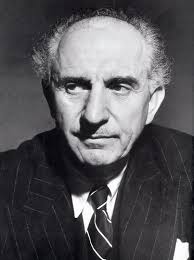
GREECE
Georgios Papandreou - 1967
In 1961, Georgios Papandreou revived Greek liberalism
by founding the Center Union Party. His party won the elections
of November 1963 and those of 1964, the second with a landslide
majority.
His progressive policies as premier aroused much opposition in
conservative circles.
Greek King Constantine II openly opposed Papandreou's government,
and there were frequent ultra-rightist plots in the Army, which
destabilized the government. Finally the King engineered a split
in the Centre Union and in July 1965, he dismissed the government
following a dispute over control of the Ministry of Defense.
In April 1967, a military coup led by a Colonels' junta led by
George Papadopoulos, overthrew Papandreou, who was arrested.
Papadopoulos' regime imposed martial law, the press was subjected
to harsh censorship and thousands of the regime's political opponents
were thrown into prison or exiled. Torture of political prisoners
in general, and communists in particular, was carried on.
The regime was supported by the United States because of its staunchly
anti-communist stance.
Papandreou died under house arrest in November 1968.
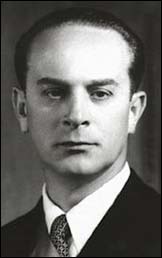
GUATEMALA
Jacobo Arbenz - 1954
In 1944 several civilian groups
and progressive military factions led by Jacabo Árbenz
and Francisco Arana rebelled against the Guatemalan government's
repressive policies. In the elections that followed, Juan José
Arévalo was elected president, and began a highly popular
program of social reform. Árbenz was appointed Minister
of Defense.
After the death of Arana, Árbenz contested the presidential
elections that were held in 1950, won the election, and continued
social reform policies, including an expanded right to vote, the
ability of workers to organize, legitimizing political parties,
and allowing public debate.
The centerpiece of his policy was an agrarian reform law under
which uncultivated portions of large land-holdings were expropriated
in return for compensation and redistributed to poverty-stricken
agricultural laborers. Approximately 500,000 people benefited
from the decree. The majority of them were indigenous people,
whose forebears had been dispossessed after the Spanish invasion.
Because his policies ran afoul of the United Fruit Company, the
single largest land owner in Guatemala, United Fruit lobbied the
United States government to have him overthrown.
The U.S. was also concerned by the presence of communists in the
Guatemalan government.
Árbenz was ousted in a 1954 coup d'état engineered
by the US Department of State and the Central Intelligence Agency.
John Foster Dulles, President Dwight Eisenhower's Secretary of
State at the time was on the Board of United Fruit.
Colonel Carlos Castillo Armas replaced Arbenz as president. Árbenz
went into exile through several countries, where his family gradually
fell apart. His daughter committed suicide, and he died in Mexico
in 1971.
The coup ended a brief period of popular democratic government
in Guatemala, and resulted in a series of brutal right-wing dictators
that have ruled the country ever since.
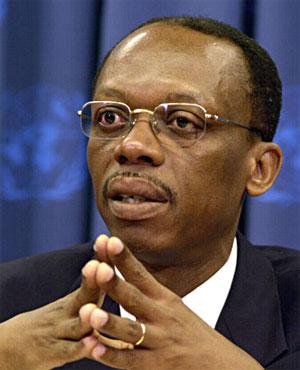
HAITI
Jean-Bertrand Aristide - 1991
and 2004
Unspeakable crimes have been done
to Haiti. At one time it was a rich country, but it was stripped
of its wealth by France. Then United States backed dictatorships
that terrorized Haiti for decades. The Haitian people lived on
the brink of survival. Even though there wasn't much left to exploit,
the US continued to back repressive regimes that have plundered
the country to this day.
Under the barbaric rule of Francois 'Papa Doc' and his son Jean-Claude
'Baby Doc' Duvalier, the US provided massive military and intelligence
aid - with the help of Israel. And after Baby Doc Duvalier was
brought down by a popular uprising, the US continued to back the
Duvaliers' vicious paramilitary force - the Tonton Macoutes.
Starting around 1989, the US Defense Intelligence Agency (DIA)
encouraged the formation of FRAPH - government-supported paramilitary
gangsters - that terrorized Haitians for years.
Then, for a brief period in the late 1980s and early 1990s, the
Haitian majority organized, put together a popular movement that
brought down 'Baby Doc' Duvalier, and elected former priest Jean-Bertrand
Aristide to the Presidency in 1990. Aristide tried to push a popular
platform that would raise the minimum wage and redistribute some
of Haiti's the wealth to the poor.
In response, George H W Bush supported a coup that ousted Aristide
from power in 1991 and installed a military dictatorship. Bill
Clinton continued to support the coup dictatorship.
Aristide was allowed to return to Haiti in 1994 to finish his
term, under the condition that he agree to abandon the economic
program of the popular movement that got him elected, and instead
accept an economically-destructive World Bank-IMF program, which
redistributed Haiti's wealth from the poor to the rich.
Following popular unrest in Haiti, the U.S. allowed Aristide to
run for office again in 2001, but he was cut off from the popular
movement that had elected him, and the economy suffered under
the restrictive IMF/World Bank structural adjustment programs.
In 2004, Aristide was again ousted from power in a U.S.-supported
paramilitary coup, was kidnapped at gunpoint, and was flown against
his will, on a U.S. military plane, to the Central African Republic.
He later moved to South Africa, until he was finally allowed to
return to Haiti in 2011, but was barred from politics. (The U.S.
had allowed the former Haitian dictator Jean-Claude 'Baby Doc'
Duvalier to return to Haiti from exile France earlier that year).
When Aristide was forced from office in 2004, the very brief period
of popularly-elected democratic government in Haiti came to an
end.
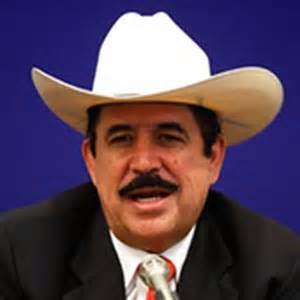
HONDURAS
Manuel Zelaya - 2009
Manuel Zelaya was the popularly-elected
President of Honduras from January 27, 2006 until June 28, 2009.
On Jun2 28, 2009, the Honduran Army followed orders from the Honduran
Supreme Court to oust President Zelaya and send him into exile.
The crisis was prompted when Zelaya attempted to schedule a non-binding
poll on holding a referendum to rewrite the constitution, a move
that trade unions, indigenous groups, and social activist organizations
had long been lobbying for. The constitution had been written
by the Honduran military in 1982, and the one-term presidential
limit allowed the generals to dominate the politics of the country.
After Zelaya refused to comply with court orders to cease, the
Honduran Supreme Court issued a secret warrant for his arrest.
Two days later, Honduran soldiers stormed the president's house
in the middle of the night and detained him. Instead of bringing
him to trial, the army put him on a military plane and flew him
into exile in Costa Rica.
International reaction to the 2009
Honduran coup d'état was widespread. The United Nations,
the Organization of American States (OAS), and the European Union
condemned the removal of Zelaya as a military coup. On 5 July
2009, all member states of the OAS voted by acclamation to suspend
Honduras from the organization.
In July 2011, Honduras's Truth Commission concluded that Zelaya's
removal from office was illegal and a coup. The Commission found
Congress' designation of Roberto Micheletti as interim president
as unconstitutional.
The United States was involved
in the coup through the National Endowment for Democracy (NED)
and the U.S. Agency for International Development (USAID) that
contribute to right-wing organizations that supported the coup,
including the Peace and Democracy Movement and the Civil Democratic
Union.
Many of the officers that took Zelaya into exile were trained
at the "School for the Americas" that has seen torturers
and coup leaders from all over Latin America pass through its
doors.
The aircraft that carried Zelaya the night of his abduction landed
at a U.S. military base in Honduras, before continuing to its
final destination in Costa Rica.
When Zelaya journeyed to the Honduran-Nicaragua border after the
coup, U.S. Secretary of State Hillary Clinton denounced him for
being 'provocative', however, the State Department said nothing
about a report by the Committee of Disappeared Detainees in Honduras
charging 1,100 human rights violations by the coup regime, including
detentions, assaults, and murder.
In the old days, when the United States routinely overthrew governments
that displeased it, the Marines would have gone in, as they did
in Guatemala and Nicaragua, or the CIA would have engineered a
coup by the local elites. But the fingerprints of U.S. institutions
like the NED, USAID, and School for the Americas, plus powerful
corporations and dedicated Cold War warriors, were all over the
Zelaya coup.
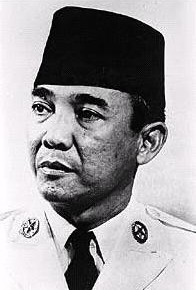
INDONESIA
General Sukarno - 1967
Sukarno was the first President
of Indonesia, serving in office from 1945 to 1967.
Sukarno was the leader of his country's struggle for Independence
from the Netherlands. He was a prominent leader of Indonesia's
nationalist movement during the Dutch colonial period, and spent
over a decade under Dutch detention until released by the invading
Japanese forces. Upon Japanese surrender, Sukarno and Mohammad
Hatta declared Indonesian independence on 1945, and Sukarno was
appointed as first president. He led Indonesians in resisting
Dutch re-colonization efforts via diplomatic and military means
until the Dutch acknowledgement of Indonesian independence in
1949.
After a chaotic period of parliamentary democracy, Sukarno established
an autocratic system in 1957 that successfully ended instability
and rebellions which were threatening the survival of the country.
The early 1960s saw Sukarno moving Indonesia to the left by providing
support and protection to the Indonesian Communist Party (PKI).
In 1965, Sukarno was overthrown in a CIA-backed coup by General
Muhammad Suharto and other senior military officers. Indonesian
government forces with collaboration of some civilians perpetrated
mass killings over many months. The CIA acknowledged that the
massacres ranked as one of the worst mass murders of the 20th
Century. Estimates of the number of civilians killed range from
a half million to three million. The US had detailed, ongoing
knowledge of the mass killings, and provided the Indonesian army
with thousands of names of Sukarno PKI supporters and other leftists,
which US officials checked off from their lists those who had
been murdered.
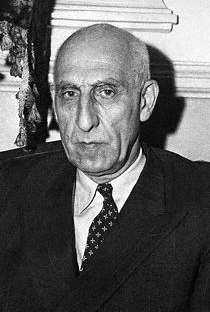
IRAN
Mohammad Mossadegh - 1953
Iranian Prime Minister Mohammad
Mosaddegh was overthrown in 1953 in a coup orchestrated by the
United States' Central Intelligence Agency (CIA) and Britain's
Secret Intelligence Service MI6.
An author, administrator, lawyer, and prominent parliamentarian,
Mosaddegh's administration introduced a range of social and political
actions such as social security and land reforms. His government's
most notable policy was the seizure by nationalization of the
Iranian oil industry, which had been established by the British
since 1913 through the Anglo-Persian Oil Company (later British
Petroleum/BP).
The coup is commonly referred to in the West as Operation Ajax
after its CIA cryptonym.
Mosaddegh was imprisoned for three years, then put under house
arrest until his death, and was buried in his own home so as to
prevent a political furor.
The coup saw Mohammad Reza Shah Pahlavi return to power as an
absolute dictator who relied heavily on United States' government
support to hold on to power until his own overthrow in February
1979.
Many Iranians regard Mosaddegh as the leading champion of secular
democracy and resistance to foreign domination in Iran's modern
history.
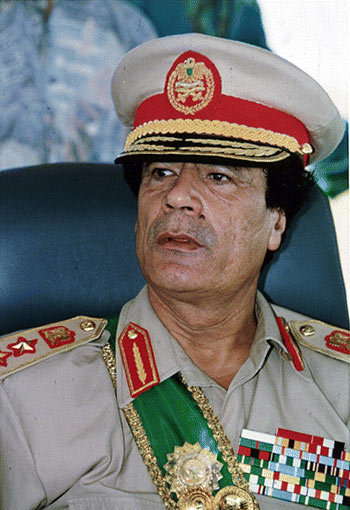
LIBYA
Muammar Gaddafi - 2011
Muammar Gaddafi, was a Libyan military
leader, revolutionary and politician.
He had founded a revolutionary cell which deposed the Western-backed
monarchy of King Idris in a 1969 coup. Having taken power, Gaddafi
converted Libya into a republic governed by his Revolutionary
Command Council. Ruling by decree, he ejected Western military
bases from Libya while strengthening ties to Arab nationalist
governments. He nationalized the oil industry and used the state
revenues to bolster the military, fund foreign revolutionaries
and implement social programs emphasizing house-building, healthcare
and education projects.
Libya's alleged responsibility for the Lockerbie bombing in Scotland
in 1988 left it increasingly isolated on the world stage. A particularly
hostile relationship developed with the United States and Europe
when Gaddafi nationalized the country's oil resources, much of
which were owned by foreign oil companies.
During the 2011 Arab Spring, protests broke out in eastern Libya.
The situation descended into civil war, in which NATO intervened
militarily on the side of the anti-Gaddafi forces.
When the government was finally overthrown in 2011 after a savage
eight-month bombing campaign, Gaddafi was tracked down and brutally
murdered - on camera.
Before the war in 2011 the World Health Organization recorded that
the country was providing comprehensive health care to all citizens
free of charge, and the CIA World Factbook noted that
Libya had a literacy rate of 94.2%. According to the UN, life
expectancy was 75 years.
The US and NATO war prosecuted against Libya in 2011, left the
once-thriving country a catastrophic shambles and a 'failed state'.
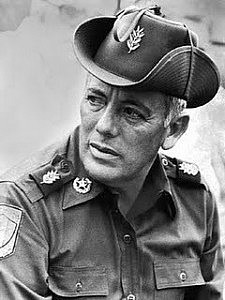
PANAMA
Omar Torrijos - 1981
Omar Torrijos, was the Commander
of the Panamanian and National Guard. He took power in a coup.
While never officially the president, he ruled Panama from 1968
to 1981. Torrijos instituted a number of social reforms and his
regime was considered progressive.
Torrijos was regarded by his supporters as the first Panamanian
leader to represent the majority population of Panama, which is
poor, Spanish-speaking, and of mixed heritage, as opposed to the
light-skinned social elite, who had long dominated the commerce
and political life of the country.
He opened many schools and created new job opportunities for those
less fortunate. Torrijos instituted a range of social and economic
reforms to improve the lot of the poor, redistributed agricultural
land and persecuted the richest and most powerful families in
the country. The reforms were accompanied by an ambitious public
works program.
In 1978, Torrijos stepped down as head of the government, but
remained de facto ruler of the country while another one of his
followers, Aristides Royo was a figurehead president.
Torrijos is best known for negotiating the 1977 TorrijosCarter
Treaties that eventually gave Panama full sovereignty over the
Panama Canal.
Torrijos died at the age of 52 when his aircraft crashed in Panama.
His suspicious death generated charges and speculation that he
was the victim of an assassination plot.
John Perkins author of the book 'Confessions of an Economic Hit
Man' said that Torrijos was assassinated by American interests,
who had a bomb planted aboard his aircraft by CIA-organized operatives.
The alleged motive was that American business leaders and politicians
strongly opposed the negotiations between Torrijos and a group
of Japanese businessmen who were promoting the idea of a new,
larger, sea-level canal for Panama whose construction would exclude
American firms.
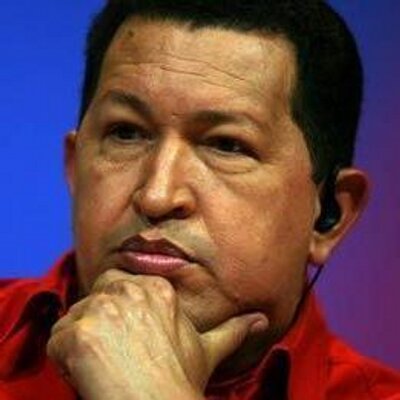
VENEZUELA
Hugo Chavez - 2002 and 2013
Hugo Chavez was President of Venezuela
from 1999 to 2013
He was elected President of Venezuela in 1998, 2000, 2006 and
2012.
In 1974 Chávez, while a military officer, visited Panama,
where he met with Panamanian leader Omar Torrijos, and was impressed
with his land reform program that was designed to benefit the
peasants. Influenced by Torrijos, he saw the potential for military
officers to seize control of a government when the civilian authorities
were perceived as serving the interests of only the wealthy elites.
Chávez became highly critical of Augusto Pinochet, the
right-wing general who had recently seized control in Chile with
the aid of the United States' CIA.
In 1981, Chávez, a captain in the Army, was assigned to
teach at the military academy where he had formerly trained. Here
he introduced new students to his "Bolivarian" ideals
and recruited some of them.
In 1989, Carlos Andrés Pérez was elected President
of Venezuela, and though he had promised to oppose the United
States government's Washington Consensus and the International
Monetary Fund's policies, he opposed neither once he got into
office, following instead neoliberal economic policies supported
by the United States and the IMF, angering the public.
Chávez prepared and led a military coup in 1992, which
was unsuccessful. Chávez gave himself up to the government
and appeared on television, in uniform, to call on the remaining
coup members to lay down their arms.
Venezuelans, particularly poor ones, began seeing him as someone
who stood up against government corruption and kleptocracy.
Following the coup attempt, Chávez was arrested and imprisoned
in a military stockade. After his release from prison, Chavez
traveled around Latin America in search of foreign support for
his new Bolivarian movement, visiting Argentina, Uruguay, Chile,
Colombia, and finally Cuba, where he met Fidel Castro and became
friends with him.
In 2002, a group of high-ranking
anti-Chávez military officers launch a coup against Chávez.
Chavez was taken and detained. Business leader Pedro Carmona declared
himself president of an interim government, abolished the 1999
constitution and appointed a small governing committee to run
the country.
The U.S. government was quick to recognize the de facto government
of Carmona, calling it a "transitional civilian government"
while failing to mention that Chavez had in fact been kidnapped
and that the coup government was in power only as the result of
a military intervention.
What neither the coup plotters nor U.S. intelligence anticipated
was the dramatic response of the Venezuelan people and their determination
to defend their duly-elected president.
Tens of thousands of people took to the streets, demanding the
return of Chavez, which inspired the loyal sections of the Venezuelan
military to act and rescue Chavez.
On April 13, the coup collapsed, and Chávez was returned
to power.
There is evidence the U.S. not
only knew about the coup plot but actively supported it.
U.S. intelligence knew of the intimate details of the plot well
in advance without informing the Venezuelan government.
The coup-plotters had met with senior U.S. officials. At a minimum,
the U.S. was an accessory.
Otto Reich was appointed by U.S. President George W. Bush as his
point man on Latin America. According to the Observer newspaper,
Reich, a fervently anti-Castro right-wing Cuban-American, met
with the coup plotters just months before the events of April
2002. The plotters would also meet with Elliot Abrams, a senior
figure during the presidency of Ronald Reagan and a senior director
at the National Security Council in Bush's administration.
The coup-plotters also allegedly met with John Negroponte, then-U.S.
ambassador to the United Nations.
In 2011, Hugo Chavez announced
that he had cancer, and underwent treatment. July 9, 2012, Chávez
declared that he had recovered from the cancer, just before the
2012 presidential election, which he won, securing a fourth term
as president. In November 2012, Chávez announced plans
to travel to Cuba for more medical treatment.
On December 2012, Chávez announced he would undergo cancer
surgery in Cuba. He suffered a postoperative respiratory infection
which was treated. Suffering a recurrence of the colon cancer,
Chavez was given chemotherapy, but his health deteriorated.
Hugo Chávez died in Caracas, Venezuela on March 5, 2013
at the age of 58.
Alfredo Molero, then Minister of
Defense, alleged that Chávez was poisoned or infected with
a cancer virus by the U.S. government. A spokesman for the U.S
State Department dismissed the claim as "absurd".
U.S. interference in Venezuelan
affairs did not end with the 2002 coup. The Venezuelan political
opposition would seek the oust Chavez later in 2002 through an
oil-sector strike that nearly destroyed the Venezuelan economy
and again through a recall referendum in 2004, both of which failed.
Despite commitments from U.S. President Barack Obama early in
his presidency that the era of U.S. interference in Latin America
was over, the policy of the U.S. government remains the same as
it was during the Bush years. To this day the U.S. continues to
finance the political opposition in Venezuela to the tune of millions
of U.S. dollars a year, with a high-ranking official from the
National Endowment for Democracy traveling to Venezuela in March
2015 to meet with politicians from the right-wing opposition.

















